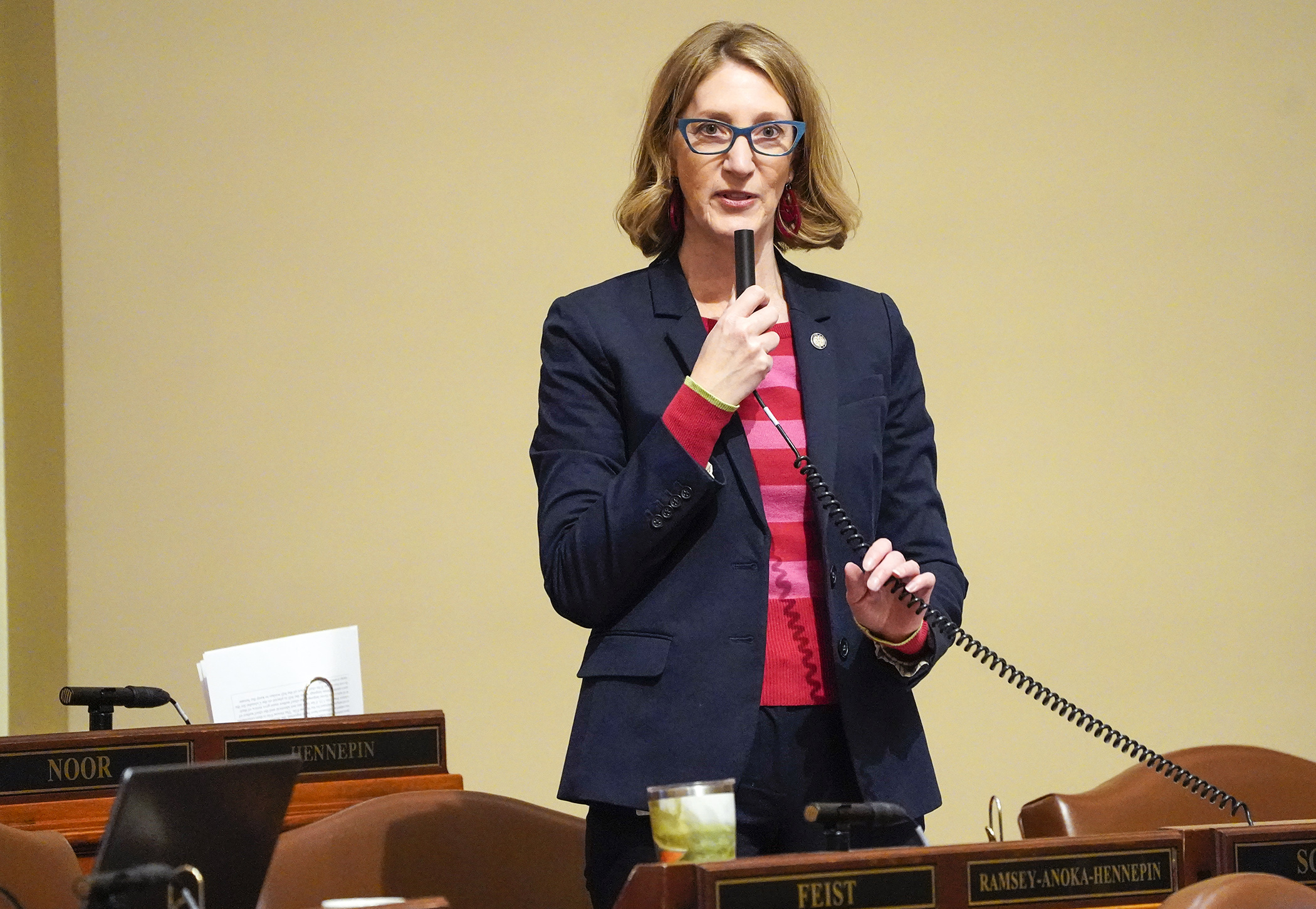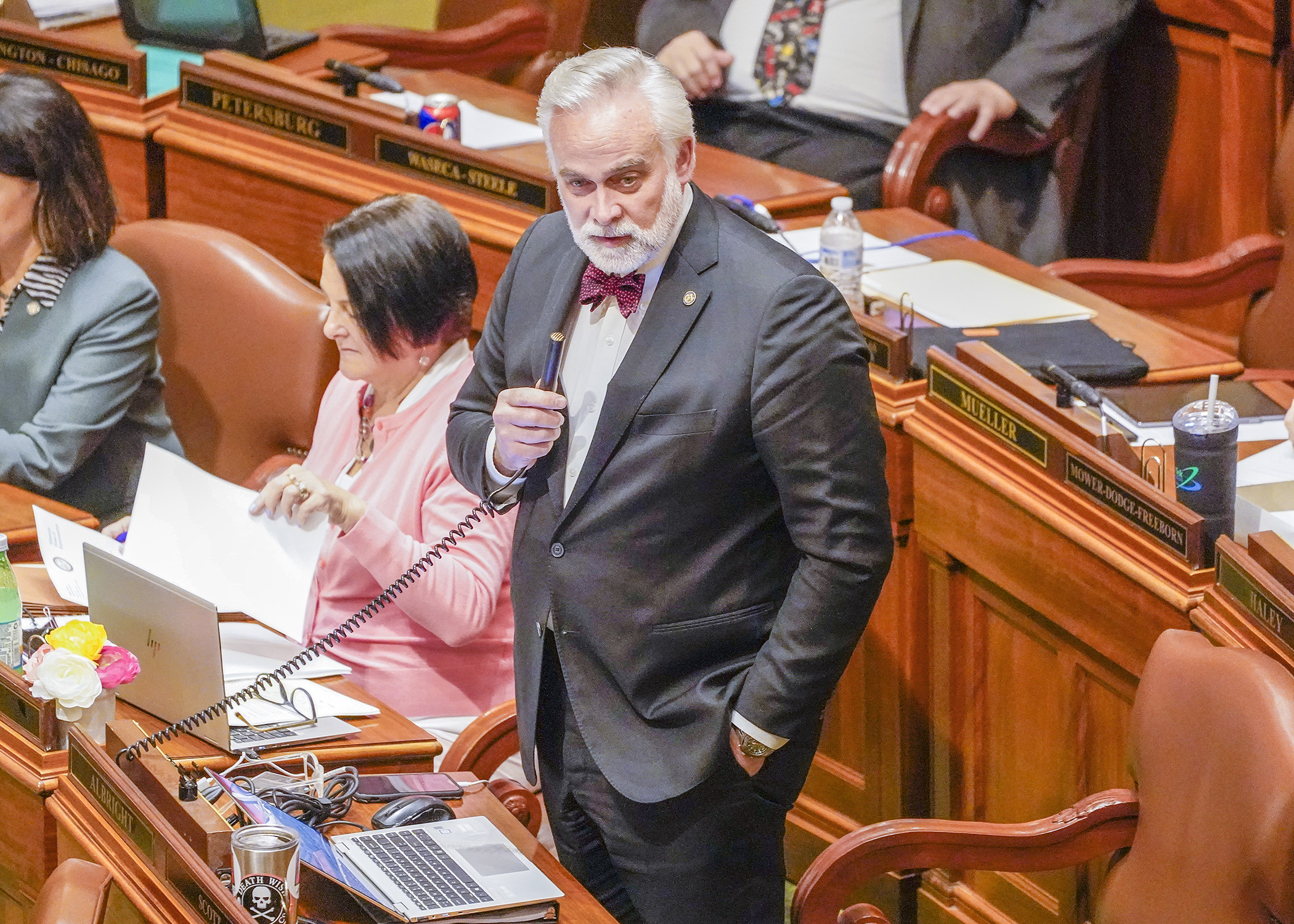House passes $768 million omnibus health and human services bill

A House was once again divided along party lines in passing an omnibus bill.
This time it was the omnibus health and human services bill that passed, as amended, 69-64 Tuesday. HF4706/SF4410* now goes back to the Senate, which passed its version 61-5 April 26. A conference committee will likely be needed to construct a compromise bill.
Total supplemental spending in the 2022-23 biennium is $768 million, with $478.7 million for human services and early childhood programs and $270.7 million aimed at health programs.
[MORE: View the spreadsheet]
“This is a bill that puts Minnesota on a path to success by making health care more affordable for Minnesotans,” said Rep. Tina Liebling (DFL-Rochester), chair of the House Health Finance and Policy Committee. She sponsors the bill with Sen. Jim Abeler (R-Anoka).
“It takes real steps to control drug prices, so Minnesotans who get a prescription can actually get the medicine they need to be healthy or sometimes even just to stay alive,” she said.
Liebling said the 876-page bill focuses on ways to support the behavioral health workforce, mental health workers, and community health workers, including grants, scholarships, and technical assistance.
Access to health care would also be increased, Liebling said, especially for seniors, people with a disability, and people in historically medically underserved communities.
Three House bills were merged last week by the House Ways and Means Committee to create the supplemental funding and policy package:
- Articles 1-4 of the omnibus early childhood bill (HF4735);
- the omnibus human services bill (HF4579); and
- the omnibus health bill (HF4706).
[MORE: List of bills included in the omnibus bill]
Rep. Jennifer Schultz (DFL-Duluth), chair of the House Human Services Finance and Policy Committee, said the omnibus bill would make “historic investments in human services.”
She said the bill reflects the high priority the committee placed on addressing health care workforces shortages across the state.
“We are investing resources into addressing the health care workforce shortage by increasing wages for personal care assistants, and funding for training to increase our health care workforce pipeline,” she said.
To that end, the omnibus bill would encourage participation in the human services workforce through tools such as tuition forgiveness, incentive pay, workforce development grants and increased reimbursement rates on wages paid to personal care assistants.
 Rep. Tony Albright speaks to the omnibus health and human services bill prior to its passage May 3. (Photo by Andrew VonBank)
Rep. Tony Albright speaks to the omnibus health and human services bill prior to its passage May 3. (Photo by Andrew VonBank)Republicans said they support some portions of the bill, but portions of it spend state money irresponsibly by funding programs that will severely strain the tax base.
“The growth of spending in this bill outpaces a number of factors,” said Rep. Tony Albright (R-Prior Lake). “It is unsustainable.”
Other areas where the bill fails, according to Republicans, are a lack of compensation for people injured by adverse effects of COVID-19 vaccines, few efforts to reduce fraud in state-run health care programs, insufficient funding for staffing nursing homes, and setting hospital nursing staff ratios that hinder the flexibility of hospital administrators.
Amendments
Only one of the 13 amendments offered was adopted, an amendment offered by Liebling making technical changes and fixing drafting errors.
None of the 12 amendments offered by Republicans was adopted, either by being voted down or being ruled out of order by not being germane to the topic of the bill being amended.
Two amendments ruled out of order were on the topic of abortion: one that would have required medical clinics performing 10 or more abortions per month to obtain a license from the Department of Health; and a second that would have prevented organizations receiving family planning grants “to directly or indirectly subsidize abortion services or related administrative expenses.”
Three other amendments ruled not germane would have:
- repealed the existing MinnesotaCare provider tax;
- expanded the procedures physical therapists are allowed to perform; and
- expanded the scope of practice of optometrists.
Amendments voted down included those that would have:
- established a pharmacogenomics task force;
- required a study of COVID-19 vaccination side effects and established a $5 million fund to compensate people having adverse reactions to the vaccine; and
- increased tuition reimbursements from $600 to $900 for EMT training courses.
Related Articles
Search Session Daily
Advanced Search OptionsPriority Dailies
Speaker Emerita Melissa Hortman, husband killed in attack
By HPIS Staff House Speaker Emerita Melissa Hortman (DFL-Brooklyn Park) and her husband, Mark, were fatally shot in their home early Saturday morning.
Gov. Tim Walz announced the news dur...
House Speaker Emerita Melissa Hortman (DFL-Brooklyn Park) and her husband, Mark, were fatally shot in their home early Saturday morning.
Gov. Tim Walz announced the news dur...
Lawmakers deliver budget bills to governor's desk in one-day special session
By Mike Cook About that talk of needing all 21 hours left in a legislative day to complete a special session?
House members were more than up to the challenge Monday. Beginning at 10 a.m...
About that talk of needing all 21 hours left in a legislative day to complete a special session?
House members were more than up to the challenge Monday. Beginning at 10 a.m...